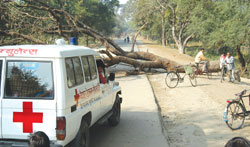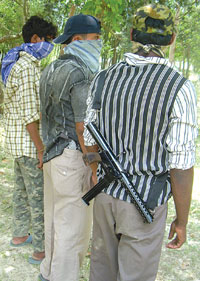|
|
| COMMON SIGHTS: During the Madhes Uprising, even ambulances were not allowed to run. Armed groups like the JTMM-Jwala (below) have effectively run the state out from parts of the tarai. |
The political agitation in the tarai is being overtaken by criminal elements. The government is floundering on negotiable issues, missing chances to talk, and can't keep up with the fluid situation. This is a serious bottleneck on the road to elections.
Most of the twelve armed groups identified by the Home Ministry are operating in the tarai's highway belt, frequently crippling Nepal's economic artery. Insec records 76 conflict-related deaths in tarai since January. The East-West highway is regularly shut down-in the three weeks from 15 June-5 July, some parts of the eastern tarai were closed for up to 18 days. The six serial bomb blasts that rocked Birganj last week weren\'t a surprise.
It is difficult to imagine an election being held under these circumstances, says Purosottam Dahal, of the Human Rights and Peace Society. Dahal and his team recently returned from a 20-district assessment tour.
The situation will only change if political progress is made. Madhesi groups are willing to talk, and it is a positive sign that the announcement of an electoral system giving madhesis 31 percent representation in the CA was not met with a public outcry from any side. But madhesis, like other underrepresented groups, were not consulted during the drafting of the law, and want to be assured it will work. They also see the law as a starting point for talks on institutional, and not just electoral, reforms.
|
|
Every new or splinter group, such as the Bisfot faction of the JTMM and the Tarai Cobras, is taking a hardline position on autonomy and threatening secession.
Moderate madhesis see this position as a bargaining chip. "The secessionist talk by the armed groups is an articulation of pent-up frustration about continuing discrimination. But the gist of madhesi demand is: treat us like Nepali, we don't want to be Indians, or anything else," says Vijay Kant Karna, a political analyst and activist with Jaghrit Nepal. He is convinced that even the radical groups will sit down to talk if they feel the government is honest about righting the wrongs.
The government has been conducting stop-and-go negotiations with the MJF on proportional representation and a federal set-up with the right to self-determination, but these have hit a roadblock, says Sarita Giri of Nepal Sadhbhawana Party (NSP), adding that there have been no meetings for over a month in part because Minister Poudel is overstretched.
In any case, the home and peace ministries can\'t kept up with the changing situation on the ground. The Forum has weakened in recent months, and analysts say talks will only be productive if all groups, armed or not, are engaged with.
Madhesi analysts concede that the lack of a unified front and credible leadership is a problem, as is the inability of the moderates to fill the vacuum created by the eroding political bases of the main parties, including the Maoists and the MJF.
There is no critical player in the tarai and that the situation could tip in any direction, says a researcher. Most madhesi factions, including the armed groups, met in Patna last month to build an alliance. So far, the idea has not taken off.
The government looks set to push ahead with election preparations, whether or not all of the tarai is on board. The onus lies on the government to send fresh peace missives to the various madhesi factions if it wants to be able to conduct an election anytime soon, says Giri.
The election has to be credible. "The whole point of the CA is to write a people's constitution, and if the government cannot ensure the participation of people from all over the country, who can be sure what kind of constitution that will lead to," says Karna.
Nepali Times




